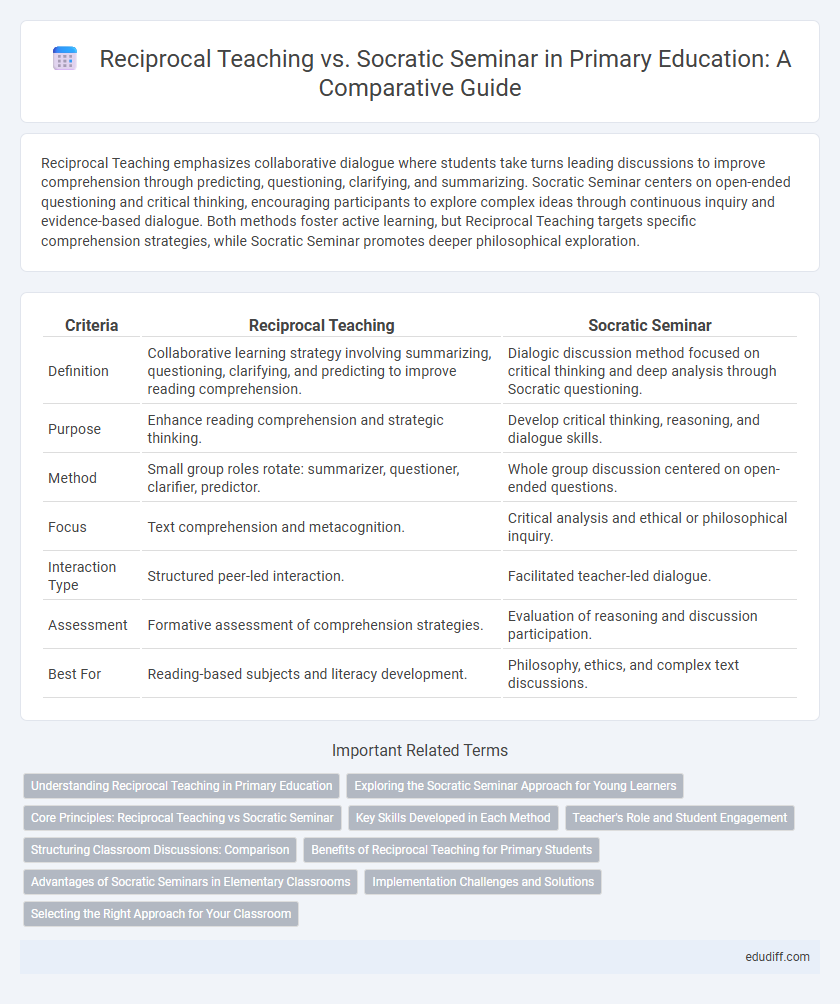Reciprocal Teaching emphasizes collaborative dialogue where students take turns leading discussions to improve comprehension through predicting, questioning, clarifying, and summarizing. Socratic Seminar centers on open-ended questioning and critical thinking, encouraging participants to explore complex ideas through continuous inquiry and evidence-based dialogue. Both methods foster active learning, but Reciprocal Teaching targets specific comprehension strategies, while Socratic Seminar promotes deeper philosophical exploration.
Table of Comparison
| Criteria | Reciprocal Teaching | Socratic Seminar |
|---|---|---|
| Definition | Collaborative learning strategy involving summarizing, questioning, clarifying, and predicting to improve reading comprehension. | Dialogic discussion method focused on critical thinking and deep analysis through Socratic questioning. |
| Purpose | Enhance reading comprehension and strategic thinking. | Develop critical thinking, reasoning, and dialogue skills. |
| Method | Small group roles rotate: summarizer, questioner, clarifier, predictor. | Whole group discussion centered on open-ended questions. |
| Focus | Text comprehension and metacognition. | Critical analysis and ethical or philosophical inquiry. |
| Interaction Type | Structured peer-led interaction. | Facilitated teacher-led dialogue. |
| Assessment | Formative assessment of comprehension strategies. | Evaluation of reasoning and discussion participation. |
| Best For | Reading-based subjects and literacy development. | Philosophy, ethics, and complex text discussions. |
Understanding Reciprocal Teaching in Primary Education
Reciprocal Teaching in primary education enhances reading comprehension by engaging students in predicting, questioning, clarifying, and summarizing texts collaboratively. This strategy promotes active interaction with content, fostering critical thinking and deeper understanding of material. Compared to Socratic Seminars, which center on open-ended discussion and critical dialogue, reciprocal teaching provides structured, scaffolded support tailored to young learners' literacy development.
Exploring the Socratic Seminar Approach for Young Learners
Socratic Seminars engage young learners in critical thinking and articulate dialogue by fostering open-ended questions and reflective listening, enhancing comprehension and collaborative skills. This approach emphasizes student-led discussions rooted in text analysis, contrasting with Reciprocal Teaching's structured roles and scaffolding techniques. Implementing Socratic Seminars in primary settings nurtures curiosity and deepens understanding through meaningful peer interaction and inquiry-based learning.
Core Principles: Reciprocal Teaching vs Socratic Seminar
Reciprocal Teaching centers on four core strategies: predicting, questioning, clarifying, and summarizing to enhance reading comprehension through guided dialogue. Socratic Seminar emphasizes critical thinking and deep understanding by engaging participants in open-ended discussions based on text analysis and evidence-based reasoning. Both methods promote collaborative learning but differ in structure and focus, with Reciprocal Teaching targeting reading strategies and Socratic Seminar prioritizing dialectical inquiry.
Key Skills Developed in Each Method
Reciprocal Teaching primarily develops skills in summarizing, questioning, clarifying, and predicting, enhancing students' comprehension and metacognitive abilities through structured dialogue. Socratic Seminar emphasizes critical thinking, active listening, and articulate reasoning, fostering deep analysis and discussion of complex texts. Both methods cultivate collaborative learning, but Reciprocal Teaching centers on guided reading strategies while Socratic Seminar promotes open-ended inquiry and dialectical reasoning.
Teacher's Role and Student Engagement
Reciprocal Teaching positions the teacher as a facilitator who models questioning, summarizing, clarifying, and predicting strategies to guide student comprehension, gradually transferring responsibility to students for leading discussions. In contrast, Socratic Seminar requires the teacher to assume the role of a neutral moderator, fostering open-ended dialogue that encourages critical thinking and deep analysis while students actively engage in collaborative inquiry. Student engagement in Reciprocal Teaching centers on practicing metacognitive strategies within guided groups, whereas Socratic Seminar emphasizes autonomous, dialogic participation that promotes diverse perspectives and reflective discourse.
Structuring Classroom Discussions: Comparison
Reciprocal Teaching structures classroom discussions through a collaborative approach where students take turns assuming roles such as summarizer, questioner, clarifier, and predictor to deepen comprehension. Socratic Seminar emphasizes open-ended dialogue guided by a teacher-facilitated question, promoting critical thinking and interpretative skills with a focus on text-based evidence. Both methods foster analytical engagement but differ in format: Reciprocal Teaching implements role-driven, scaffolded interactions, whereas Socratic Seminar relies on student-led, open discussion forums.
Benefits of Reciprocal Teaching for Primary Students
Reciprocal Teaching significantly enhances reading comprehension and critical thinking skills in primary students by engaging them actively in predicting, questioning, clarifying, and summarizing text. This interactive strategy fosters collaborative learning and boosts student confidence in discussing complex ideas. Unlike Socratic Seminars, Reciprocal Teaching provides structured support ideal for young learners developing foundational literacy skills.
Advantages of Socratic Seminars in Elementary Classrooms
Socratic Seminars in elementary classrooms foster critical thinking by encouraging students to ask open-ended questions and engage in reflective dialogue, promoting deeper comprehension. This method cultivates active listening and respectful communication skills, essential for collaborative learning environments. The emphasis on student-led discussion supports autonomy and confidence, enhancing overall academic engagement compared to Reciprocal Teaching's structured approach.
Implementation Challenges and Solutions
Reciprocal Teaching implementation challenges often include students' unfamiliarity with dialogic reading strategies and the necessity for teacher modeling, requiring sustained practice and scaffolding to develop comprehension skills. Socratic Seminar encounters difficulties in managing diverse viewpoints and encouraging equitable participation, addressed by establishing clear discussion protocols and fostering a respectful classroom culture. Both methods benefit from ongoing teacher training and adaptive assessment techniques to effectively engage students and promote critical thinking.
Selecting the Right Approach for Your Classroom
Reciprocal Teaching emphasizes student-driven dialogue through summarizing, questioning, clarifying, and predicting, ideal for improving reading comprehension in diverse classrooms. Socratic Seminar fosters critical thinking and in-depth analysis by engaging students in structured, text-based discussions that encourage open-ended questioning and active listening. Selecting the right approach depends on classroom goals: choose Reciprocal Teaching for scaffolding literacy skills and Socratic Seminar for cultivating higher-order thinking and collaborative inquiry.
Reciprocal Teaching vs Socratic Seminar Infographic

 edudiff.com
edudiff.com